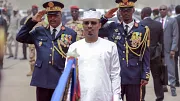As Chad’s legislative and local elections scheduled for December 29 approach, a heated debate is unfolding on the streets of N’Djamena. The opposition is calling for a boycott, while the ruling party is actively campaigning, with festive rallies, door-to-door visits, and market tours.
The opposition parties argue that “presenting candidates in these pre-determined elections is merely legitimizing a power structure that seeks to be validated.” They claim that the elections are already a foregone conclusion, and by participating, they would give legitimacy to a government that they accuse of being undemocratic.
“Boycott! Don’t participate in this farce!” chant women from the political actors’ consultation group (GCAP) as they distribute flyers marked with a red cross across N’Djamena’s bustling markets.
The group, made up of about 15 women in white t-shirts and white-and-green caps representing the coalition of opposition parties, urges the public to reject the upcoming vote.
Florence Loardomdemadje, the spokesperson for the women of GCAP, calls on her “brothers and sisters” not to support what she calls an “electoral coup,” warning against being “deceived by treacherous leaders backed by corrupt Chadians.”
The GCAP had already called for a boycott during the constitutional referendum in December 2023 and the presidential election held in May 2024. In that election, Mahamat Idriss Déby, who had been proclaimed president by the military following the death of his father, was re-elected in the first round. “These elections were not transparent and are illegitimate. The same thing is going to happen again,” Loardomdemadje asserts, accusing the government of ignoring the “cries of women and youth.”
